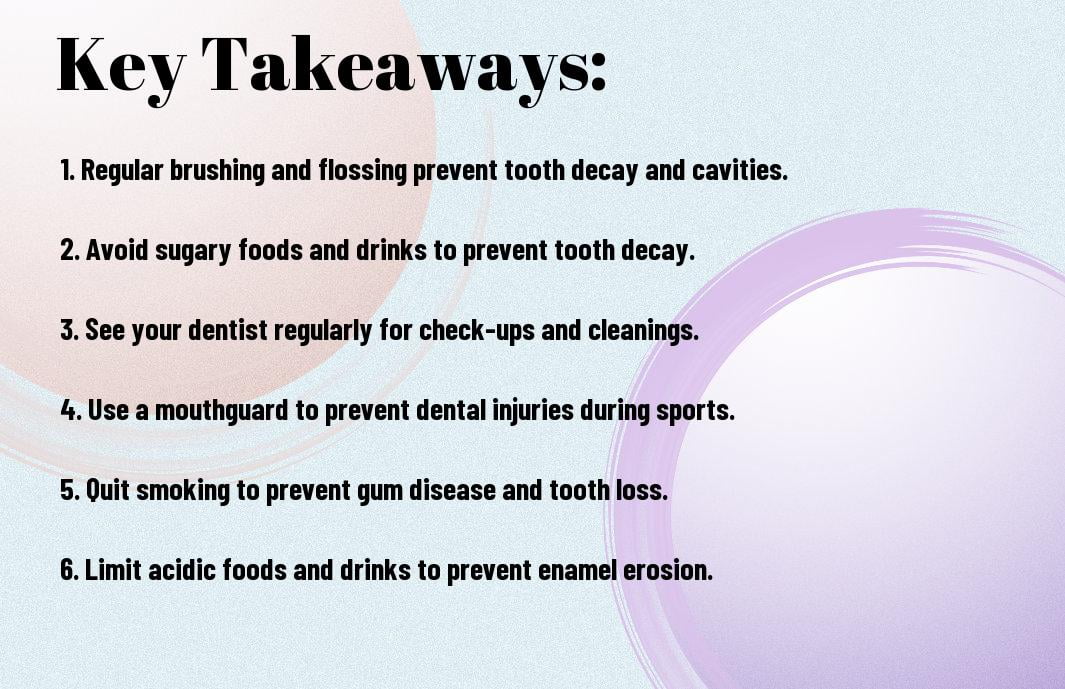Ensuring optimal dental health is crucial to your overall well-being, and preventing common dental problems is the key to maintaining a bright, healthy smile. From cavities to gum disease, it’s important to be aware of the potential issues that can arise and take proactive steps to protect your dental health. In this informative blog post, we will discuss the most common dental problems that people face and provide you with practical tips on how to prevent them. By taking action now, you can avoid costly dental procedures and enjoy a lifetime of strong, healthy teeth.
Key Takeaways:
- Regular dental check-ups are essential in preventing and detecting any potential problems before they escalate.
- Practicing good oral hygiene, including daily brushing and flossing, is crucial in preventing cavities and gum disease.
- Limiting sugary and acidic foods can help prevent tooth decay and enamel erosion.
- Wearing a mouthguard during physical activities can prevent dental injuries such as chipped or knocked out teeth.
- Avoiding tobacco and excessive alcohol can contribute to prevent gum disease and oral cancer.
Tooth Decay and Cavities
Even with regular brushing and flossing, tooth decay and cavities are common dental problems that can affect anyone. Understanding the causes of tooth decay and knowing how to prevent it are crucial for maintaining a healthy smile.
Understanding Tooth Decay
Tooth decay, also known as dental caries, is the result of the build-up of plaque on your teeth. Plaque is a sticky film of bacteria that forms on the surface of your teeth. When you consume sugary or starchy foods and beverages, the bacteria in plaque produce acids that attack the enamel of your teeth, leading to decay. If left untreated, tooth decay can progress to cavities and eventually cause pain, infection, and even tooth loss.
Prevention Strategies for Cavities
Preventing cavities starts with good oral hygiene. Brushing your teeth at least twice a day with fluoride toothpaste, flossing daily, and using mouthwash can help remove plaque and food particles that can lead to decay. Additionally, limiting your intake of sugary and acidic foods and drinks can help protect your teeth from decay. Regular dental check-ups and professional cleanings are also essential for early detection and treatment of cavities. Your dentist may also recommend protective treatments such as dental sealants and fluoride to strengthen your teeth and prevent decay.
Gum Disease
Unlike cavities, gum disease affects the soft tissue and bone that support your teeth. It is a common dental problem and can range from mild inflammation to serious damage to the soft tissue and bone that support the teeth if left untreated.
Stages and Symptoms of Gum Disease
Gum disease has three main stages: gingivitis, periodontitis, and advanced periodontitis. The symptoms of gum disease include swollen, red, or tender gums, bleeding while brushing or flossing, receding gums, and persistent bad breath. If left untreated, gum disease can lead to the loss of teeth and damage to the bone structure supporting your teeth.
Effective Prevention and Treatment
The most effective way to prevent gum disease is by practicing good oral hygiene. This includes brushing your teeth at least twice a day, flossing daily, and visiting your dentist for regular cleanings and check-ups. If you notice any of the symptoms of gum disease, it is important to see your dentist as soon as possible. They can provide professional cleanings, prescribe medication, and recommend lifestyle changes to prevent the progression of gum disease. Early intervention is crucial in effectively treating gum disease and preventing further damage.
Oral Cancer
Your oral health is of utmost importance, and one of the most serious conditions you need to be aware of is oral cancer. This type of cancer can affect the lips, tongue, cheeks, floor of the mouth, hard and soft palate, sinuses, and throat. Early detection and prevention are crucial in successfully managing oral cancer.
Identifying Risk Factors
When it comes to preventing oral cancer, understanding the risk factors is key. Smoking and tobacco use, heavy alcohol consumption, excessive sun exposure, and a diet low in fruits and vegetables can all increase your risk of developing oral cancer. Additionally, the human papillomavirus (HPV) has been linked to an increased risk of oral cancer. It’s important to be mindful of these factors and take steps to reduce your risk.
- Smoking and tobacco use
- Heavy alcohol consumption
- Excessive sun exposure
- Diet low in fruits and vegetables
- Human papillomavirus (HPV)
Any persistent sores, lumps, or white or red patches in your mouth or on your lips should be evaluated by a dental professional immediately. Regular dental check-ups are essential in identifying any potential signs of oral cancer.
Early Detection and Prevention
Early detection of oral cancer can significantly improve the prognosis and increase the chances of successful treatment. Your dentist will perform a thorough oral cancer screening during your regular check-ups, which may include visual and physical examinations, as well as additional tests. In addition to regular screenings, maintaining good oral hygiene, practicing sun safety, and making healthy lifestyle choices can help lower your risk of developing oral cancer.
Tooth Sensitivity and Erosion
One of the most common dental problems that you may experience is tooth sensitivity and erosion. This can be a source of discomfort and pain, affecting your daily life. Understanding the causes of tooth sensitivity and erosion can help you prevent and manage these issues effectively. If you want to learn more about common dental problems and their preventive measures, you can refer to A Guide to Common Dental Problems and their Preventive Measures.
Causes of Tooth Sensitivity
Tooth sensitivity can be caused by a variety of factors, including enamel erosion, teeth grinding, acidic food and drinks, and gum recession. When the protective enamel on your teeth wears away, it exposes the underlying dentin, which contains small tubules that lead to the tooth’s nerve center, causing sensitivity and discomfort.
Protecting Enamel and Reducing Erosion
To protect your enamel and reduce erosion, you can take several important steps. Avoid consuming acidic foods and drinks, use a soft-bristled toothbrush and gentle brushing technique to avoid abrasive wear on enamel, and consider using toothpaste specifically designed for sensitive teeth. You should also limit your intake of sugary and acidic foods and drinks, as they can contribute to enamel erosion. Remember that maintaining good oral hygiene practices, such as regular brushing and flossing, can also help protect your enamel and reduce the risk of tooth sensitivity and erosion.
Common Dental Problems And How To Prevent Them
From above, it is clear that there are a number of common dental problems that can affect you. However, by practicing good oral hygiene, maintaining a healthy diet, and visiting your dentist regularly, you can significantly reduce your risk of developing these issues. Remember to brush and floss daily, limit sugary and acidic foods and drinks, and schedule regular dental check-ups to keep your teeth and gums healthy. By taking these preventative measures, you can maintain a happy, healthy smile for years to come.
FAQ
Q: What are some common dental problems?
A: Common dental problems include tooth decay, gum disease, bad breath, and tooth sensitivity. These issues can be caused by poor oral hygiene, certain foods and drinks, or genetics.
Q: How can I prevent dental problems?
A: To prevent dental problems, it is important to maintain good oral hygiene by brushing teeth at least twice a day, flossing regularly, and visiting the dentist for regular check-ups. It is also important to limit the consumption of sugary foods and drinks, and to avoid smoking.
Q: What should I do if I experience a dental problem?
A: If you experience a dental problem, such as toothache, bleeding gums, or persistent bad breath, it is crucial to seek professional dental care as soon as possible. Ignoring these issues could lead to more serious problems and complications in the future.







